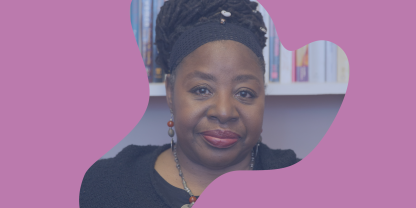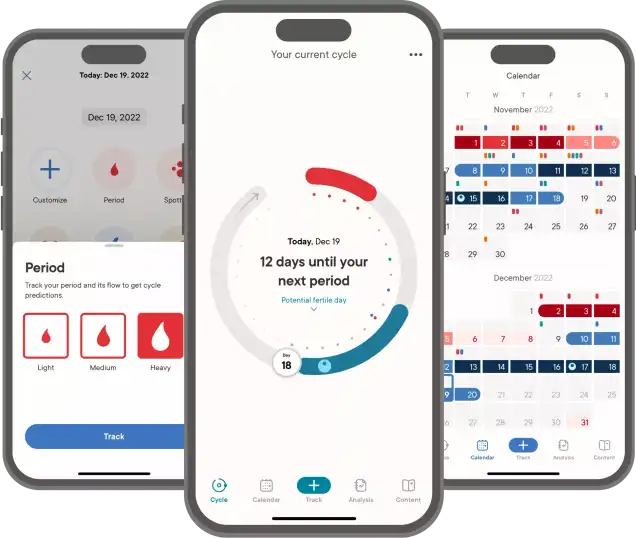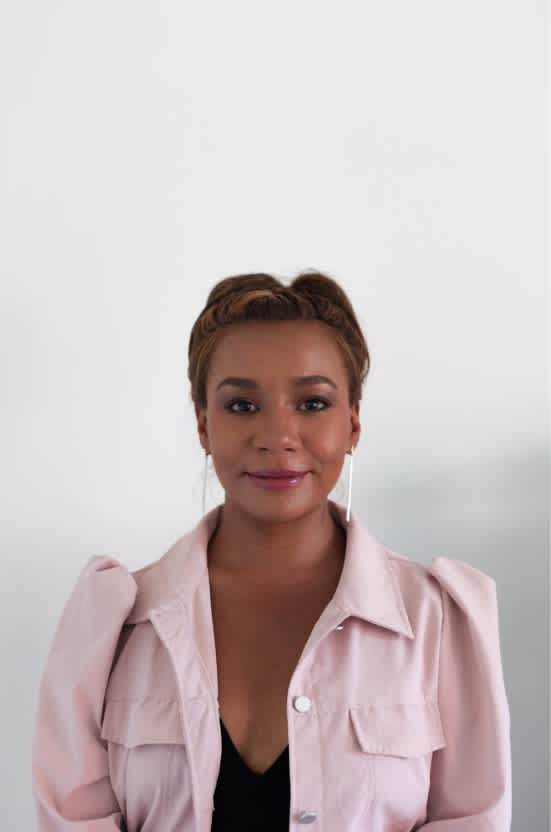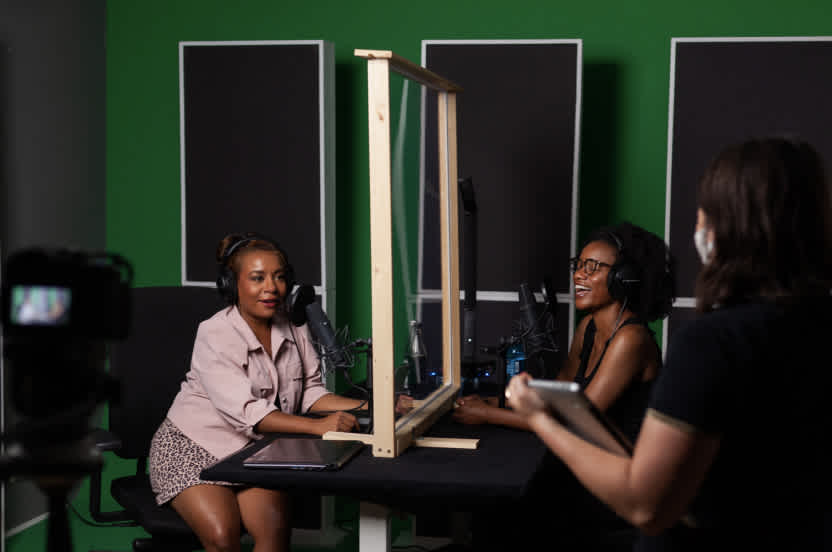


A podcast about how hormones shape our world.
Latest episode:
Who you gonna call? Mythbusters!
About Hormonal
Hormones affect everyone and everything: from skin to stress to sports.
But for most of us, they're still a mystery.
Even the way we talk about hormones makes no sense. ("She's hormonal.")
So let's clear some things up. Each week, Rhea Ramjohn is asking scientists, doctors, and experts to break it all down for us.
Subscribe on your favorite platform:
Episodes
- Season 1
- Season 2

Episode 0
August 25, 2020
A Sneak Peek at Season 2
As we work hard on Season 2 of the Hormonal podcast, we’re dropping into your feed with a special request, and a small behind the...
5 min

Episode 1
October 11, 2020
Hot or not? Birth control & sex drive
How birth control affects your sexual desire, self image, and weight fluctuations.
25 min
Support Hormonal & the period tracker that’s different from the rest.
Subscribe to Clue Plus
Episode 2
October 19, 2020
The ABC: Abortion & Birth Control
What’s it like to get an abortion and the surprising ways the pandemic is changing abortion access.
34 min

Episode 3
October 26, 2020
The many sides of side effects
Hormonal birth control: positive, negative, and neutral effects
33 min
Support Hormonal & the period tracker that’s different from the rest.
Subscribe to Clue Plus
Reproductive choice and reproductive justice
with Dr. Loretta Ross
Episode 4
November 2, 2020
Reproductive choice and reproductive justice
Accessing birth control against the odds
35 min

Episode 5
November 9, 2020
Happy birthday, birth control
Controversy and celebration on the 60th anniversary of the pill
42 min


Episode 7
November 23, 2020
Risky business: birth control during COVID-19
COVID-19 is changing how we access birth control
30 min
Support Hormonal & the period tracker that’s different from the rest.
Subscribe to Clue Plus
Who you gonna call? Mythbusters!
with Lynae Brayboy, Amanda Shea & Hajnalka Hejja
Episode 8
November 30, 2020
Who you gonna call? Mythbusters!
Clue’s Science Team busts your birth control myths
37 min
Credits
Season 2
Executive Producer: Kassandra Sundt
Host: Rhea Ramjohn
Editorial Help from: Amanda Shea, Steph Liao, Nicole Leeds
Clue Design: Marta Pucci & B.J. Scheckenbach
Web Team: Yomi Eluwande, Jane Parr-Burman, Maddie Sheesley
Special Thanks: Trudie Carter, Ryan Duncan, Aubrey Bryan,
Claudia Taylor, Léna Calvarin, Lynae Brayboy
Mixing and recording help from: Bose Park Productions & Rekorder Studios in Berlin.
About Clue
Clue is a period tracking app that uses data and science to help women and people wih cycles to understand their bodies. It's also a menstrual and reproductive health encyclopedia.
Learn more about the Clue app and check out what Clue is doing to advance menstrual health research.



Rhea Ramjohn,
host of the Hormonal Podcast


Rhea Ramjohn,
host of the Hormonal Podcast
Your Host
The more knowledge we have about our hormones, our medical & menstrual care, and our reproductive rights, the more we empower ourselves and one another.
Hormonal has offered me the true privilege of speaking with people who have the expertise on the scientific knowledge about our hormones and cycles, as well as those sharing their lived experiences, caring for people with menstruation and how, all combined, shapes our lives everyday.
Gathering facts as well as personal stories are so vital to our understanding of our health, our his/herstories, and our cultures. I deem it a privilege because we haven't had many platforms nor opportunities for menstrual health information being broadly accessible.
Episode 3
The many sides of side effects
The many sides of side effects
Hormonal birth control: positive, negative, and neutral effects
About
Most people take birth control because they want to avoid getting pregnant. But, as many of us find out after taking a pill or a shot or getting a device inserted, that’s not the only thing that happens! There are other shifts in the body that take place when you try something new.
Transcript
This transcript and interview were edited for clarity.
This episode of Hormonal is brought to you with financial support from Bayer. To learn more about Bayer’s support of Hormonal and other work here at Clue, check out helloclue.com/bayer.
Hey. It’s Kassandra. I’m the Executive Producer here at the podcast.
On Hormonal we explore the science behind hormones. But we also talk about society and the world around us. We know that there are lots of women who have periods and lots who don’t. We also know that there are people who aren’t women who have periods too. We also know we have listeners who have never had periods. We hope you feel welcome, even when a term that a guest uses maybe doesn’t apply to you.
At Clue, we believe that our identities are not determined by our bodies and we hope you feel welcome. Thanks for listening to Hormonal.
Rhea Ramjohn Hi, I'm Rhea Ramjohn, and you're listening to Hormonal brought to you by Clue, the menstrual health app. This season on the Hormonal podcast, we’re focusing on birth control. How it affects us personally, physically, and politically.
So, this might be obvious to some people but I’m going to say it anyway: a big part of why a lot of people use birth control is to prevent pregnancy.
But that's not the only reason. And avoiding a potential pregnancy is not the only thing that happens when users decide to pop a pill or get a shot or insert a device.
There’s a lot going on inside our bodies to begin with, add a menstrual cycle on top of that, and a new medication on top of that, there's countless combinations of side effects.
So. How does birth control, that new medication or device, affect the harmony of our bodies, namely those side effects. And there are so many to talk about: Acne, hair loss, hair growth, weight gain, weight loss, mood swings, headaches, menstruation!
To talk more about the side effects and what to expect when you're trying not to expect a pregnancy. We're joined by Dr. Gabriela Aguilar. She’s a fellow in Complex Family Planning and a clinical instructor at Yale University in the Department of Obstetrics, Gynecology & Reproductive Sciences. She joins us now from the Yale Broadcast Studio in New Haven, Connecticut. Gabby, thanks so much for joining us on Hormonal.
Gabriella Aguilar: Thanks for having me, Rhea. It's great to be here.
Rhea Ramjohn: So tell us, how should we be thinking about the categories of birth control? How do they work?
Gabriella Aguilar: Yeah, I think the way that I like to think about birth control is into a few different categories. First, the ones that have hormones, the ones that don't have hormones. I like to think about what's permanent, what's not permanent. And I like to think about the timeframe of birth control. So is this something that you do once or have a procedure or surgery once? Or is this something that you have to remember to do every few months, every few weeks or every day?
Rhea Ramjohn: Right. OK. That sounds like a lot of options, actually. And can you tell us what are the most popular forms of birth control for people with menstrual cycles?
Gabriella Aguilar Actually, the most popular form is having sterilization done. So, people will say, having your tubes tied, when really what they're technically doing nowadays mostly is not actually tying the tubes. They're either taking out a piece of them or taking them out entirely. But followed by that would be things like the birth control pill and condoms.
Rhea Ramjohn I find that to be really shocking, that sterilization ranks so high in terms of popularity in terms of birth control in the U.S., but listeners just so you know, those top choices for birth control totally depend on the study and the year. There’s some fluctuation within those top choices of birth control. But regardless. Or as some of my friends in Boston say, “irregardless,” can you tell me a little bit more about why that is the most popular choice and then also a little bit more about the other forms of birth control?
Gabriella Aguilar: Yes, sure. Well, I think with sterilization, when people feel like they reach their family size, that feels appropriate for them. They want to be done-done. And so sterilization is viewed as that method that is permanent because it is meant to be permanent. And it does have an incredibly low failure rate. And so I think that when people feel like they're done, they don't want to risk any more chance of becoming pregnant and having an unintended or unwanted pregnancy, then they're like, "I'm done. So let's go ahead and do the most permanent thing."
Rhea Ramjohn: OK. We don’t have time on this podcast to go over every type of birth control option and their side effects, because that would take the whole season. But check the show notes for a helloclue.com article about the side effects associated with every hormonal birth control option.
But let’s go over some of the most popular forms of birth control and their side effects. You mentioned sterilization is the most popular, so let’s start there. What are the side effects associated with Sterilization?
Gabriella Aguilar: Sure. Well, I think with sterilization, one thing to consider and remember is that it's typically a surgical procedure that's either done immediately after delivery or during the time of delivery. In terms of side effects, well, after that, you would have most of your post surgery side effects of things like pain and discomfort. They're not really from the surgery itself, but more from having surgery in general. So you would expect to have all the typical things after having had a major abdominal surgery.
Rhea Ramjohn: OK, OK, I understand. So you said that the pill was the second most common form of birth control in the U.S.. Could you tell us a little bit more about the side effects of taking the pill?
Gabriella Aguilar: Sure. So side effects, significant side effects are really uncommon. But the things that we hear about, about the most, it kind of depends on which birth control pill that you're taking. So when thinking about birth control pills, you can generally divide them into two categories, the ones that are called combined oral contraceptive pills, which include estrogen. And then the progesterone only pills, which do not include estrogen. They have progesterone only and the side effects for those are fairly similar, though, a little bit different. So a lot of individuals choose a combined oral contraceptive pill because of some beneficial side effects, things like improved acne or clearer skin, some negative side effects that I would say are generally associated with any kind of birth control pill that I've heard from patients are things like headaches, nausea. Some people get breast tenderness if you are using the birth control pill and not using it as directed, you can have some abnormal bleeding side effects as well. And that's much more common with the progesterone only pill.
Rhea Ramjohn: Right. And when you say, not used as directed, you mean not taking it at the same time every day or missing a day. I see. OK. And would that also apply, would those be similar side effects that you find with an IUD?
Gabriella Aguilar: They can be, So, I think that the IUD side effects are...they're quite different from birth control pill side effects, even including the progesterone only pill. But everybody has, you know, I like to tell everyone that not everyone has the same bleeding profile, even though we can say that we can give them the most common instances. So if you're using the IUD, we know that 30% of women will stop having menstrual cycles. 30% will have maybe lighter, shorter menstrual cycles. And then, you know, everybody else is just going to have the same that they always had. And with the progesterone only pill, we talk about having regular monthly periods with some irregular breakthrough bleeding if the pills are not taken at the exact same time every day.
Rhea Ramjohn: Like I mentioned earlier, it would take much much too long to go through every kind of birth control and it’s associated side effects here on the podcast. So, to see a complete list of hormonal birth control options and their side effects, check the show notes for a link to helloclue.com.
But, before we switch gears, the big question: what about copper versus hormonal IUDS?
Gabriella Aguilar: Yeah, this is one of my favorite things to talk about.
Rhea Ramjohn: Saving the best for last, Gabby.
Gabriella Aguilar: Yeah, saving the best for last. The copper IUD has no hormones at all whatsoever. So it's really great for those rare individuals who truly cannot have estrogen or progesterone. And so those people tend to be patients who have breast cancer or history of breast cancer. So the copper IUD works because it has these little tiny coils of copper wrapped around like the arms and the body of the IUD. And this copper causes what we call a sterile, inflammatory reaction, which I know sounds really scary, but it really isn't. It just causes some changes within, like the fluid in your reproductive tract that we see in the uterus and all the way through the tubes, that impacts the ability of sperm to do its job. So it kind of, we say it kills sperm and that's how it prevents, like, fertilization from occurring. And then, of course, we know that these reactions impact cervical mucus as well. And then the other IUD, the hormonal IUD, the levonorgestrel IUD, works by releasing a small dose of progesterone just inside of the uterus so that we know that it's impacting primarily the lining of the uterus. There are not significant levels of progesterone hormone found in your bloodstream or what we call systemic progesterone levels. And what it does is it works to over time thin that lining of the uterus. And so for some people, it becomes so thin that they completely stop having periods because there's nothing to shed every month. And for others, it's just thinner than what it was before. So they may have shorter, lighter periods. And for other people, it just stays the exact same.
Rhea Ramjohn: Right. Ok
Gabriella Aguilar: And the other thing that it does as well is creates like a thicker cervical mucus, again, impeding the mobility of sperm.
Rhea Ramjohn: OK, so I made a little joke that it was saving the best for last, but we don't know if that might actually be the best option for every single person. Right?
Gabriella Aguilar: Right.
Rhea Ramjohn: So what kinds of questions do you ask patients who are coming in asking you about birth control?
Gbriella Aguilar: Um, well, I tend to typically ask them about what their goals are in terms of their fertility. Do they want to conceive, at all? If they do, on what timeframe for them? I also like to ask people about whether or not they feel like they want to have control over their birth control method, like they can start it and stop it whenever they want. I also like to ask people about their menstrual cycles and ask if they want any changes in their menstrual cycles. Because one of the things that I didn't mention, I forgot to mention about the copper IUD, is that one side effect is heavier and longer periods. That is typically for the first six or so months. We can see that resolve over time, but for some people, that doesn't resolve. So if somebody comes to me and says, “Well, I already have very heavy periods, in fact, I'm anemic from it and I've needed blood transfusions before,” I would not be recommending a copper IUD for them. So I try to ask all of those questions to kind of do some shared decision making with each patient and try to identify or help them themselves identify what the right birth control option is for them.
Rhea Ramjohn: Okay. And when someone is starting a new form of birth control, what are the most common side effects that you tell them to look out for?
Gabriella Aguilar: Yeah. So initially, you know, most people in general don't feel significant side effects after starting a new birth control method. But if it's something like a device that was placed so maybe an implant in the arm or an IUD in the uterus. We talk to people because that's a procedure. We talk to them about looking for warning signs of things like infection. Even though there are many things that we do to make sure to prevent infection from happening after insertion of these devices. But things like, you know, maybe on the arm, any redness or swelling, any fevers. If you've had an IUD placed. We talk about, you know, having some bleeding and spotting after the placement, maybe some intense cramping or cramping that's a little bit stronger than their regular periods. And then, of course, after starting like any birth control pills or the ring or the patch, the injection, we talk to everybody about just calling us if they don't feel right or if they don't feel well. But most of the time, we actually don't hear from anybody because they are tolerating their birth control really well.
Rhea Ramjohn: Right, I understand. So when we talk about side effects, it usually triggers in people's minds that there are only negative things that are coming from using these forms of birth control, headaches, weight gain, a lot of people hear about that, acne and so on. But some side effects can actually also be a bonus. Isn't that right?
Gabriella Aguilar: Yes. Yes, that's true. So the side effect of not having periods is highly desired by some people. It's not for others. There are a lot of individuals out there that actually feel reassured by having a monthly menstrual cycle to let them know that they're not pregnant. And so those are the options that cause your periods to go away, or amenorrhea, would not be good for those individuals. But others love it.
Rhea Ramohn: We also had a question from one of our listeners who asked about the diaphragm and why the diaphragm isn't really talked about anymore or or even discussed as an option at the doctor's office?
Gabriella Aguilar: Yeah. The diaphragm has, is just not as popular. That's one reason. We really don't have patients coming in and asking about it all that often. And secondly, it's not that effective, quite frankly.
Rhea Ramjohn: And since we mentioned our listeners, we actually collected some questions from them, and I’m going to almost rapid fire throw some to you now.
Gabriella Aguilar: Yeah of course.
Rhea Ramjohn: Okay. So one big topic that came up a few times, was questions about mental health, for instance. This one is from Soph C.
"What are the effects of birth control on people with anxiety and or depression?"
Gabriella Aguilar: So we do try to exercise caution in those who have a history of mood disorders with some of those like higher higher dose progesterone methods, because we know that progesterone can have that impact. And the only method that we know of where we exercise caution intentionally is with the medroxyprogesterone, that depo injection for those with history disorders. But, of course, if anybody at all feels like their mood disorder is impacted in any way by whatever hormonal method that they're using. They should definitely talk to their physician about it and engage in a conversation about either discontinuing the method, changing the method, or talking about other ways to address the mood disorder, because sometimes it's hard to tell if it's the birth control or if it's the mood disorder itself.
Rhea Ramjohn: I see. OK. Here’s a question from Stacey.
“What kind of medications can affect the efficacy of the birth control pill?”
Gabriella Aguilar: Yeah, so there are I would say most commonly seizure medications can impact the birth control pill. There are, there are quite a few. So I feel like if you are somebody who has medical conditions and are taking medications at all, but especially if you're taking multiple medications, it's really important for you to talk to your physician about whether or not these medications are going to interact with your birth control method. But the one thing that we always talk about the most is seizure medication and how it impacts birth control pills.
Rhea Ramjohn: Okay. Good to know. Here’s another question, this one from Charlotte:
“What are the risks of breast cancer with hormonal contraception?”
Gabriella Aguilar: Yeah. That’s a great question Charlotte, and thanks for asking. I think that that’s one area that’s particularly controversial, because, you know, that research studies and the data that we’ve seen have been conflicting. I think that generally we want to say, that it doesn’t affect your risk of breast cancer. But there have been some more recent studies that maybe there is a slight increased risk, but the question is really if there is an increased risk, is it clinically significant, and how would that change our practices? But the other thing that I do like to talk to patients about is, the fact that using certain kinds of contraceptive methods can actually reduce your risk of other cancers, so things like ovarian cancer, or endometrial cancer, which is cancer of the lining of the uterus. Both of those can be reduced by using either birth control pills or things that prevent you from ovulating, that’s what reduces that risk of ovarian cancer. And then anything that thins the lining of the uterus, so things like a progesterone IUD, end up reducing your risk of developing endometrial cancer later. But that’s a wonderful question and thanks for asking.
Rhea Ramjohn: That's also good to know. And what can one expect when we're coming off of birth control?
Gabriella Aguilar: Yeah, you can expect all those if you experience any significant changes when starting the birth control pills, you may experience them again when coming off. But again, most people starting or stopping birth control methods don't experience anything significant at all. For those who are coming off of birth control that significantly change their menstrual cycles or their skin, for example, those changes might reverse and revert back to what they were before using that particular contraceptive method.
Rhea Ramjohn: OK. Thanks for indulging us in a little bit of rapid fire. For listeners who want to know more about any of these specific issues, make sure you check out our encyclopedia of menstrual information on helloclue.com.
Gabby, we’re going to talk more about this when we return from this quick break.
Hormonal is brought to you by Clue. The period tracking app, and menstrual health encyclopedia, that takes your cycle seriously.
And right now, we’re asking for your help. Clue needs your financial support to keep the lights on. You can do that by becoming a Clue plus subscriber. Your subscription not only keeps the work here at Clue going, but it also supports menstrual health research around the world, and protects data privacy.
Your subscription gives you access to our entire library of articles as well as new articles, app features, and curated content as they’re released.
For more on how to support the work and reap the benefits of becoming a Clue Plus subscriber, check out clue.plus.
Alright, back to the show.
Rhea Ramjohn: You’re listening to Hormonal, from Clue, the menstrual health app.
So Dr. Aguilar, Gabby, if a listener is considering a new form of birth control, what should they consider in terms of being aware of their own health, or their home life situation before they come and talk to a doctor?
Gabriella Aguilar: Sure. Well, I would say that the first thing to think about, of course, is whether or not, how they would feel about a birth control failure. So how they would feel about maybe like an unintended pregnancy, because, of course, we know that different birth control options have different levels of effectiveness. I would also, you know, encourage them to think about their entire life. So maybe they're like home, work, school life and where they want their birth control to fit into that. So, you know, somebody who is very busy working and also has four kids at home and is like doing school in the evening as well, might not be somebody who's crazy, crazy busy, may feel that, you know, having to remember to use their birth control every day or every week might be too much to fit into their life. And so we could potentially talk about options that you would not need to think about as frequently. I think that's actually a really important factor. When considering options and before even going into the doctor's office, I am thinking about how involved I want to be in my birth control?
Rhea Ramjohn: I wanted to ask you to tell me a little bit more about going from, let's say, 10 to 14 menstrual cycles a year to maybe down to zero because, one of the side effects of some of these birth control measures is no periods.
Could that be an advantage for some users of that form of birth control that may be reducing their menstrual cycles to zero? I mean, you mentioned how it can be advantageous to have your period as a marker of not being pregnant every month. But what could be some of the advantages? What would your patient be looking for, in that, in that instance?
Gabriella Aguilar: Well, I think one thing that, you know, I've heard from patients as well is: Wow, I haven't spent any money on menstrual products this year. I didn't realize how much I was spending every month.
Rhea Ramjohn: Wow. That's a good point.
Gabriella Aguilar: I think that's something that could be beneficial as well. I mean, there is, of course, the cost of getting a device or something placed that would help you end up in that situation. But, of course, I think many, many people who menstruate don't think about how much they actually spend on these products.
Rhea Ramjohn: Right.
Gabriella Aguilar: And then, of course, I think that for those who are significantly impeded by their menstrual cycle, so perhaps maybe those who have really severe endometriosis I'm thinking about, or people who are otherwise, you know, debilitated by their cycles, not having them and having some hormonal balance and pain under better control can significantly improve their quality of life. So things like working, going to school, going out and engaging in hobbies like exercise, that could potentially significantly improve the quality of life.
Rhea Ramjohn: OK. All right. Now let's move a little bit away from the hormonal forms of birth control and talk about those forms that we don't hear very much about in terms of side effects of the non hormonal version. So, for instance, with condoms, I have heard zero side effects, maybe other than, than a latex allergy. And just from my personal experience, I went to Catholic high school only a little while ago and we were actually taught in our sex education class. It's often a stereotype that Catholic school does not have sex education. But my school did. And they actually taught us the rhythm method, you know, as a way of taking a look at planning out our cycle every month, keeping track of when, we were menstruating, what our vaginal discharge looked like. I mean, this was really horrifying for a teenager, as you can imagine. But now I can understand, you know, that, yeah, this was a form of birth control that was quite popular for a lot of people for a long time. And nowadays we don't hear about it, just as we mentioned before, the diaphragm. It's not really talked about anymore. And the most mechanical popular form, I would say, are condoms. So are there any sort of, quote unquote, side effects with any of these non hormonal birth control methods?
Gabriella Aguilar: Mhmm. We call them barrier methods because they're creating a barrier between like the sperm and entry into the reproductive tract. I think that we don't hear much about side effects. You're right. Other than if you did have a latex allergy and had some sort of reaction afterwards that could cause some, you know, discomfort of the vulva, potential changes and discharge. But I think the thing, you know, I'm not sure that I would call it a side effect, but the the issues that people bring up, of course, are things like power dynamics and condom negotiation and feeling comfortable about asking partners to use condoms to, you know, of course, making sure that they have condoms, whether it's themself or their partner. So things like access to condoms become important. And then, of course, having the empowerment to feel comfortable asking a partner to use them, and navigating maybe the conversation if someone is declining to use them.
Rhea Ramjohn: Right, and not to stray too much from the point you’re about to make because I think it’s important, but we are a science podcast, and I just want to let listeners know, that there are also some chemicals present in condoms too, and that can be a source of irritation or Vaginitis. Just putting that info out there!
Now. What about if you are the partner of someone who is taking hormonal birth control or using any of these forms of birth control? What can we watch out for in terms of health or as you just mentioned, in terms of even support in, in being empowered in the relationship or in the partnership? What are some of the ways that we can be supportive partners?
Gabriella Aguilar: Yeah, I think that, you know, being supportive––if somebody just had a procedure, for example, for their contraceptive device, I say device because really the devices are the only things that can require a procedure––just be very supportive in that short term period. You know, somebody who has an implant placed in their arm, they're gonna be sore for a day or two. And, you know, maybe the supportive partner can, you know, be more helpful around physically. Right? Because their arm is going to be a little bit less useful. If they've had an IUD placement, you know, we tell most people just take it easy. But, you know, typically you can go right back to work school or carry on with whatever you're doing earlier in the day. You know, so just being supportive in just understanding and knowing that your partner just might not feel 100% that day, you know, it might take a day or two. And I think that that's probably the most important way. And then, of course, the ones where we know, they'll really have to step up as if somebody just had surgery, for example, to have their sterilization. Whether you have it at C-section, post vaginal delivery or laparoscopically with the little incisions, you know, this is still major abdominal surgery. We tell people to take it easy for four to six weeks afterwards. And so partners and family members should really step up with helping out, all around, I would say.
Rhea Ramjohn: In thinking about also the amount of responsibility that people who are trying not to get pregnant actually carry in order to make sure that they don't get pregnant. That's quite a bit of responsibility upon one half of the relationship. So do you have any tips for the partners out there, how to support people who may have the physical responsibility of preventing pregnancy in their relationship?
Gabriella Aguilar: Well, I think it's just, in all partnerships, it's important to remember to be compassionate. And then, of course, you can, like every partnership has different financial capabilities, of course. And so, you know, it's a conversation to have about. You know, who's who's comfortable, you know, fronting costs and things like that. So if you're talking about condoms, for example, is one person always responsible for buying condoms? Are you going to split the cost? Are you going to, you know, swap every other box? These are all just individual conversations to have.
Rhea Ramjohn: Yes, and those are some really good ideas. As we wrap up, I want to make sure listeners have the really critical information. So, are there any specific red flags that we should look out for where we know we have to absolutely get in touch with our doctor?
Gabriella Aguilar: You know, what I like to tell people is that if you just don't feel right, you should always call your doctor. But red flags, if you've just had a procedure and you have any signs of infection. So things like fever, redness, changes, imaginal discharge or severe pain. Those are all reasons to call your provider immediately. And then, of course, if you're using other methods that didn't require a procedure, you just want to pay attention to your body. So if you've had significant changes in, let's say, for example, your mood or significant changes in your bleeding where all of a sudden, you know, you're bleeding so much that you're getting dizzy and not feeling well. These are all reasons to call your provider immediately.
Rhea Ramjohn: Dr. Gabriela Aguilar is a fellow in Complex Family Planning and a clinical instructor at Yale University in the Department of Obstetrics, Gynecology & Reproductive Sciences.”
She joined us today from New Haven Connecticut.
Gabby, Doctor Aguilar, thank you so much for joining us on Hormonal.
Gabriella Aguilar: Thank you.
Rhea Ramjohn: Hormonal is hosted by me, Rhea Ramjohn! Our Executive Producer is Kassandra Sundt.
CREDITS
Editorial help from:
Amanda Shea
Steph Liao
Nicole Leeds
Special thanks to:
Marta Pucci
Trudie Carter
Maddie Sheesley
Ryan Duncan
Aubrey Bryan
Claudia Taylor
Léna Calvarin
Lynae Brayboy
Mixing and recording help from Bose Park Productions and Rekorder Studios in Berlin.
Thanks for listening to Hormonal. Please rate and subscribe, and tell a friend!
Until next time, I’m Rhea Ramjohn.
Related links:

Episode 3
October 26, 2020
The many sides of side effects
Hormonal birth control: positive, negative, and neutral effects
About
Most people take birth control because they want to avoid getting pregnant. But, as many of us find out after taking a pill or a shot or getting a device inserted, that’s not the only thing that happens! There are other shifts in the body that take place when you try something new.
"The side effect of not having periods is highly desired by some people. It’s not for others."
This episode of Hormonal is brought to you with financial support from Bayer. To learn more about Bayer’s support of Hormonal and other work here at Clue, check out helloclue.com/bayer.
Hey. It’s Kassandra. I’m the Executive Producer here at the podcast.
On Hormonal we explore the science behind hormones. But we also talk about society and the world around us. We know that there are lots of women who have periods and lots who don’t. We also know that there are people who aren’t women who have periods too. We also know we have listeners who have never had periods. We hope you feel welcome, even when a term that a guest uses maybe doesn’t apply to you.
At Clue, we believe that our identities are not determined by our bodies and we hope you feel welcome. Thanks for listening to Hormonal.
Rhea Ramjohn Hi, I'm Rhea Ramjohn, and you're listening to Hormonal brought to you by Clue, the menstrual health app. This season on the Hormonal podcast, we��’re focusing on birth control. How it affects us personally, physically, and politically.
So, this might be obvious to some people but I’m going to say it anyway: a big part of why a lot of people use birth control is to prevent pregnancy.
But that's not the only reason. And avoiding a potential pregnancy is not the only thing that happens when users decide to pop a pill or get a shot or insert a device.
There’s a lot going on inside our bodies to begin with, add a menstrual cycle on top of that, and a new medication on top of that, there's countless combinations of side effects.
So. How does birth control, that new medication or device, affect the harmony of our bodies, namely those side effects. And there are so many to talk about: Acne, hair loss, hair growth, weight gain, weight loss, mood swings, headaches, menstruation!
To talk more about the side effects and what to expect when you're trying not to expect a pregnancy. We're joined by Dr. Gabriela Aguilar. She’s a fellow in Complex Family Planning and a clinical instructor at Yale University in the Department of Obstetrics, Gynecology & Reproductive Sciences. She joins us now from the Yale Broadcast Studio in New Haven, Connecticut. Gabby, thanks so much for joining us on Hormonal.
Gabriella Aguilar: Thanks for having me, Rhea. It's great to be here.
Rhea Ramjohn: So tell us, how should we be thinking about the categories of birth control? How do they work?
Gabriella Aguilar: Yeah, I think the way that I like to think about birth control is into a few different categories. First, the ones that have hormones, the ones that don't have hormones. I like to think about what's permanent, what's not permanent. And I like to think about the timeframe of birth control. So is this something that you do once or have a procedure or surgery once? Or is this something that you have to remember to do every few months, every few weeks or every day?
Rhea Ramjohn: Right. OK. That sounds like a lot of options, actually. And can you tell us what are the most popular forms of birth control for people with menstrual cycles?
Gabriella Aguilar Actually, the most popular form is having sterilization done. So, people will say, having your tubes tied, when really what they're technically doing nowadays mostly is not actually tying the tubes. They're either taking out a piece of them or taking them out entirely. But followed by that would be things like the birth control pill and condoms.
Rhea Ramjohn I find that to be really shocking, that sterilization ranks so high in terms of popularity in terms of birth control in the U.S., but listeners just so you know, those top choices for birth control totally depend on the study and the year. There’s some fluctuation within those top choices of birth control. But regardless. Or as some of my friends in Boston say, “irregardless,” can you tell me a little bit more about why that is the most popular choice and then also a little bit more about the other forms of birth control?
Gabriella Aguilar: Yes, sure. Well, I think with sterilization, when people feel like they reach their family size, that feels appropriate for them. They want to be done-done. And so sterilization is viewed as that method that is permanent because it is meant to be permanent. And it does have an incredibly low failure rate. And so I think that when people feel like they're done, they don't want to risk any more chance of becoming pregnant and having an unintended or unwanted pregnancy, then they're like, "I'm done. So let's go ahead and do the most permanent thing."
Rhea Ramjohn: OK. We don’t have time on this podcast to go over every type of birth control option and their side effects, because that would take the whole season. But check the show notes for a helloclue.com article about the side effects associated with every hormonal birth control option.
But let’s go over some of the most popular forms of birth control and their side effects. You mentioned sterilization is the most popular, so let’s start there. What are the side effects associated with Sterilization?
Gabriella Aguilar: Sure. Well, I think with sterilization, one thing to consider and remember is that it's typically a surgical procedure that's either done immediately after delivery or during the time of delivery. In terms of side effects, well, after that, you would have most of your post surgery side effects of things like pain and discomfort. They're not really from the surgery itself, but more from having surgery in general. So you would expect to have all the typical things after having had a major abdominal surgery.
Rhea Ramjohn: OK, OK, I understand. So you said that the pill was the second most common form of birth control in the U.S.. Could you tell us a little bit more about the side effects of taking the pill?
Gabriella Aguilar: Sure. So side effects, significant side effects are really uncommon. But the things that we hear about, about the most, it kind of depends on which birth control pill that you're taking. So when thinking about birth control pills, you can generally divide them into two categories, the ones that are called combined oral contraceptive pills, which include estrogen. And then the progesterone only pills, which do not include estrogen. They have progesterone only and the side effects for those are fairly similar, though, a little bit different. So a lot of individuals choose a combined oral contraceptive pill because of some beneficial side effects, things like improved acne or clearer skin, some negative side effects that I would say are generally associated with any kind of birth control pill that I've heard from patients are things like headaches, nausea. Some people get breast tenderness if you are using the birth control pill and not using it as directed, you can have some abnormal bleeding side effects as well. And that's much more common with the progesterone only pill.
Rhea Ramjohn: Right. And when you say, not used as directed, you mean not taking it at the same time every day or missing a day. I see. OK. And would that also apply, would those be similar side effects that you find with an IUD?
Gabriella Aguilar: They can be, So, I think that the IUD side effects are...they're quite different from birth control pill side effects, even including the progesterone only pill. But everybody has, you know, I like to tell everyone that not everyone has the same bleeding profile, even though we can say that we can give them the most common instances. So if you're using the IUD, we know that 30% of women will stop having menstrual cycles. 30% will have maybe lighter, shorter menstrual cycles. And then, you know, everybody else is just going to have the same that they always had. And with the progesterone only pill, we talk about having regular monthly periods with some irregular breakthrough bleeding if the pills are not taken at the exact same time every day.
Rhea Ramjohn: Like I mentioned earlier, it would take much much too long to go through every kind of birth control and it’s associated side effects here on the podcast. So, to see a complete list of hormonal birth control options and their side effects, check the show notes for a link to helloclue.com.
But, before we switch gears, the big question: what about copper versus hormonal IUDS?
Gabriella Aguilar: Yeah, this is one of my favorite things to talk about.
Rhea Ramjohn: Saving the best for last, Gabby.
Gabriella Aguilar: Yeah, saving the best for last. The copper IUD has no hormones at all whatsoever. So it's really great for those rare individuals who truly cannot have estrogen or progesterone. And so those people tend to be patients who have breast cancer or history of breast cancer. So the copper IUD works because it has these little tiny coils of copper wrapped around like the arms and the body of the IUD. And this copper causes what we call a sterile, inflammatory reaction, which I know sounds really scary, but it really isn't. It just causes some changes within, like the fluid in your reproductive tract that we see in the uterus and all the way through the tubes, that impacts the ability of sperm to do its job. So it kind of, we say it kills sperm and that's how it prevents, like, fertilization from occurring. And then, of course, we know that these reactions impact cervical mucus as well. And then the other IUD, the hormonal IUD, the levonorgestrel IUD, works by releasing a small dose of progesterone just inside of the uterus so that we know that it's impacting primarily the lining of the uterus. There are not significant levels of progesterone hormone found in your bloodstream or what we call systemic progesterone levels. And what it does is it works to over time thin that lining of the uterus. And so for some people, it becomes so thin that they completely stop having periods because there's nothing to shed every month. And for others, it's just thinner than what it was before. So they may have shorter, lighter periods. And for other people, it just stays the exact same.
Rhea Ramjohn: Right. Ok
Gabriella Aguilar: And the other thing that it does as well is creates like a thicker cervical mucus, again, impeding the mobility of sperm.
Rhea Ramjohn: OK, so I made a little joke that it was saving the best for last, but we don't know if that might actually be the best option for every single person. Right?
Gabriella Aguilar: Right.
Rhea Ramjohn: So what kinds of questions do you ask patients who are coming in asking you about birth control?
Gbriella Aguilar: Um, well, I tend to typically ask them about what their goals are in terms of their fertility. Do they want to conceive, at all? If they do, on what timeframe for them? I also like to ask people about whether or not they feel like they want to have control over their birth control method, like they can start it and stop it whenever they want. I also like to ask people about their menstrual cycles and ask if they want any changes in their menstrual cycles. Because one of the things that I didn't mention, I forgot to mention about the copper IUD, is that one side effect is heavier and longer periods. That is typically for the first six or so months. We can see that resolve over time, but for some people, that doesn't resolve. So if somebody comes to me and says, “Well, I already have very heavy periods, in fact, I'm anemic from it and I've needed blood transfusions before,” I would not be recommending a copper IUD for them. So I try to ask all of those questions to kind of do some shared decision making with each patient and try to identify or help them themselves identify what the right birth control option is for them.
Rhea Ramjohn: Okay. And when someone is starting a new form of birth control, what are the most common side effects that you tell them to look out for?
Gabriella Aguilar: Yeah. So initially, you know, most people in general don't feel significant side effects after starting a new birth control method. But if it's something like a device that was placed so maybe an implant in the arm or an IUD in the uterus. We talk to people because that's a procedure. We talk to them about looking for warning signs of things like infection. Even though there are many things that we do to make sure to prevent infection from happening after insertion of these devices. But things like, you know, maybe on the arm, any redness or swelling, any fevers. If you've had an IUD placed. We talk about, you know, having some bleeding and spotting after the placement, maybe some intense cramping or cramping that's a little bit stronger than their regular periods. And then, of course, after starting like any birth control pills or the ring or the patch, the injection, we talk to everybody about just calling us if they don't feel right or if they don't feel well. But most of the time, we actually don't hear from anybody because they are tolerating their birth control really well.
Rhea Ramjohn: Right, I understand. So when we talk about side effects, it usually triggers in people's minds that there are only negative things that are coming from using these forms of birth control, headaches, weight gain, a lot of people hear about that, acne and so on. But some side effects can actually also be a bonus. Isn't that right?
Gabriella Aguilar: Yes. Yes, that's true. So the side effect of not having periods is highly desired by some people. It's not for others. There are a lot of individuals out there that actually feel reassured by having a monthly menstrual cycle to let them know that they're not pregnant. And so those are the options that cause your periods to go away, or amenorrhea, would not be good for those individuals. But others love it.
Rhea Ramohn: We also had a question from one of our listeners who asked about the diaphragm and why the diaphragm isn't really talked about anymore or or even discussed as an option at the doctor's office?
Gabriella Aguilar: Yeah. The diaphragm has, is just not as popular. That's one reason. We really don't have patients coming in and asking about it all that often. And secondly, it's not that effective, quite frankly.
Rhea Ramjohn: And since we mentioned our listeners, we actually collected some questions from them, and I’m going to almost rapid fire throw some to you now.
Gabriella Aguilar: Yeah of course.
Rhea Ramjohn: Okay. So one big topic that came up a few times, was questions about mental health, for instance. This one is from Soph C.
"What are the effects of birth control on people with anxiety and or depression?"
Gabriella Aguilar: So we do try to exercise caution in those who have a history of mood disorders with some of those like higher higher dose progesterone methods, because we know that progesterone can have that impact. And the only method that we know of where we exercise caution intentionally is with the medroxyprogesterone, that depo injection for those with history disorders. But, of course, if anybody at all feels like their mood disorder is impacted in any way by whatever hormonal method that they're using. They should definitely talk to their physician about it and engage in a conversation about either discontinuing the method, changing the method, or talking about other ways to address the mood disorder, because sometimes it's hard to tell if it's the birth control or if it's the mood disorder itself.
Rhea Ramjohn: I see. OK. Here’s a question from Stacey.
“What kind of medications can affect the efficacy of the birth control pill?”
Gabriella Aguilar: Yeah, so there are I would say most commonly seizure medications can impact the birth control pill. There are, there are quite a few. So I feel like if you are somebody who has medical conditions and are taking medications at all, but especially if you're taking multiple medications, it's really important for you to talk to your physician about whether or not these medications are going to interact with your birth control method. But the one thing that we always talk about the most is seizure medication and how it impacts birth control pills.
Rhea Ramjohn: Okay. Good to know. Here’s another question, this one from Charlotte:
“What are the risks of breast cancer with hormonal contraception?”
Gabriella Aguilar: Yeah. That’s a great question Charlotte, and thanks for asking. I think that that’s one area that’s particularly controversial, because, you know, that research studies and the data that we’ve seen have been conflicting. I think that generally we want to say, that it doesn’t affect your risk of breast cancer. But there have been some more recent studies that maybe there is a slight increased risk, but the question is really if there is an increased risk, is it clinically significant, and how would that change our practices? But the other thing that I do like to talk to patients about is, the fact that using certain kinds of contraceptive methods can actually reduce your risk of other cancers, so things like ovarian cancer, or endometrial cancer, which is cancer of the lining of the uterus. Both of those can be reduced by using either birth control pills or things that prevent you from ovulating, that’s what reduces that risk of ovarian cancer. And then anything that thins the lining of the uterus, so things like a progesterone IUD, end up reducing your risk of developing endometrial cancer later. But that’s a wonderful question and thanks for asking.
Rhea Ramjohn: That's also good to know. And what can one expect when we're coming off of birth control?
Gabriella Aguilar: Yeah, you can expect all those if you experience any significant changes when starting the birth control pills, you may experience them again when coming off. But again, most people starting or stopping birth control methods don't experience anything significant at all. For those who are coming off of birth control that significantly change their menstrual cycles or their skin, for example, those changes might reverse and revert back to what they were before using that particular contraceptive method.
Rhea Ramjohn: OK. Thanks for indulging us in a little bit of rapid fire. For listeners who want to know more about any of these specific issues, make sure you check out our encyclopedia of menstrual information on helloclue.com.
Gabby, we’re going to talk more about this when we return from this quick break.
Hormonal is brought to you by Clue. The period tracking app, and menstrual health encyclopedia, that takes your cycle seriously.
And right now, we’re asking for your help. Clue needs your financial support to keep the lights on. You can do that by becoming a Clue plus subscriber. Your subscription not only keeps the work here at Clue going, but it also supports menstrual health research around the world, and protects data privacy.
Your subscription gives you access to our entire library of articles as well as new articles, app features, and curated content as they’re released.
For more on how to support the work and reap the benefits of becoming a Clue Plus subscriber, check out clue.plus.
Alright, back to the show.
Rhea Ramjohn: You’re listening to Hormonal, from Clue, the menstrual health app.
So Dr. Aguilar, Gabby, if a listener is considering a new form of birth control, what should they consider in terms of being aware of their own health, or their home life situation before they come and talk to a doctor?
Gabriella Aguilar: Sure. Well, I would say that the first thing to think about, of course, is whether or not, how they would feel about a birth control failure. So how they would feel about maybe like an unintended pregnancy, because, of course, we know that different birth control options have different levels of effectiveness. I would also, you know, encourage them to think about their entire life. So maybe they're like home, work, school life and where they want their birth control to fit into that. So, you know, somebody who is very busy working and also has four kids at home and is like doing school in the evening as well, might not be somebody who's crazy, crazy busy, may feel that, you know, having to remember to use their birth control every day or every week might be too much to fit into their life. And so we could potentially talk about options that you would not need to think about as frequently. I think that's actually a really important factor. When considering options and before even going into the doctor's office, I am thinking about how involved I want to be in my birth control?
Rhea Ramjohn: I wanted to ask you to tell me a little bit more about going from, let's say, 10 to 14 menstrual cycles a year to maybe down to zero because, one of the side effects of some of these birth control measures is no periods.
Could that be an advantage for some users of that form of birth control that may be reducing their menstrual cycles to zero? I mean, you mentioned how it can be advantageous to have your period as a marker of not being pregnant every month. But what could be some of the advantages? What would your patient be looking for, in that, in that instance?
Gabriella Aguilar: Well, I think one thing that, you know, I've heard from patients as well is: Wow, I haven't spent any money on menstrual products this year. I didn't realize how much I was spending every month.
Rhea Ramjohn: Wow. That's a good point.
Gabriella Aguilar: I think that's something that could be beneficial as well. I mean, there is, of course, the cost of getting a device or something placed that would help you end up in that situation. But, of course, I think many, many people who menstruate don't think about how much they actually spend on these products.
Rhea Ramjohn: Right.
Gabriella Aguilar: And then, of course, I think that for those who are significantly impeded by their menstrual cycle, so perhaps maybe those who have really severe endometriosis I'm thinking about, or people who are otherwise, you know, debilitated by their cycles, not having them and having some hormonal balance and pain under better control can significantly improve their quality of life. So things like working, going to school, going out and engaging in hobbies like exercise, that could potentially significantly improve the quality of life.
Rhea Ramjohn: OK. All right. Now let's move a little bit away from the hormonal forms of birth control and talk about those forms that we don't hear very much about in terms of side effects of the non hormonal version. So, for instance, with condoms, I have heard zero side effects, maybe other than, than a latex allergy. And just from my personal experience, I went to Catholic high school only a little while ago and we were actually taught in our sex education class. It's often a stereotype that Catholic school does not have sex education. But my school did. And they actually taught us the rhythm method, you know, as a way of taking a look at planning out our cycle every month, keeping track of when, we were menstruating, what our vaginal discharge looked like. I mean, this was really horrifying for a teenager, as you can imagine. But now I can understand, you know, that, yeah, this was a form of birth control that was quite popular for a lot of people for a long time. And nowadays we don't hear about it, just as we mentioned before, the diaphragm. It's not really talked about anymore. And the most mechanical popular form, I would say, are condoms. So are there any sort of, quote unquote, side effects with any of these non hormonal birth control methods?
Gabriella Aguilar: Mhmm. We call them barrier methods because they're creating a barrier between like the sperm and entry into the reproductive tract. I think that we don't hear much about side effects. You're right. Other than if you did have a latex allergy and had some sort of reaction afterwards that could cause some, you know, discomfort of the vulva, potential changes and discharge. But I think the thing, you know, I'm not sure that I would call it a side effect, but the the issues that people bring up, of course, are things like power dynamics and condom negotiation and feeling comfortable about asking partners to use condoms to, you know, of course, making sure that they have condoms, whether it's themself or their partner. So things like access to condoms become important. And then, of course, having the empowerment to feel comfortable asking a partner to use them, and navigating maybe the conversation if someone is declining to use them.
Rhea Ramjohn: Right, and not to stray too much from the point you’re about to make because I think it’s important, but we are a science podcast, and I just want to let listeners know, that there are also some chemicals present in condoms too, and that can be a source of irritation or Vaginitis. Just putting that info out there!
Now. What about if you are the partner of someone who is taking hormonal birth control or using any of these forms of birth control? What can we watch out for in terms of health or as you just mentioned, in terms of even support in, in being empowered in the relationship or in the partnership? What are some of the ways that we can be supportive partners?
Gabriella Aguilar: Yeah, I think that, you know, being supportive––if somebody just had a procedure, for example, for their contraceptive device, I say device because really the devices are the only things that can require a procedure––just be very supportive in that short term period. You know, somebody who has an implant placed in their arm, they're gonna be sore for a day or two. And, you know, maybe the supportive partner can, you know, be more helpful around physically. Right? Because their arm is going to be a little bit less useful. If they've had an IUD placement, you know, we tell most people just take it easy. But, you know, typically you can go right back to work school or carry on with whatever you're doing earlier in the day. You know, so just being supportive in just understanding and knowing that your partner just might not feel 100% that day, you know, it might take a day or two. And I think that that's probably the most important way. And then, of course, the ones where we know, they'll really have to step up as if somebody just had surgery, for example, to have their sterilization. Whether you have it at C-section, post vaginal delivery or laparoscopically with the little incisions, you know, this is still major abdominal surgery. We tell people to take it easy for four to six weeks afterwards. And so partners and family members should really step up with helping out, all around, I would say.
Rhea Ramjohn: In thinking about also the amount of responsibility that people who are trying not to get pregnant actually carry in order to make sure that they don't get pregnant. That's quite a bit of responsibility upon one half of the relationship. So do you have any tips for the partners out there, how to support people who may have the physical responsibility of preventing pregnancy in their relationship?
Gabriella Aguilar: Well, I think it's just, in all partnerships, it's important to remember to be compassionate. And then, of course, you can, like every partnership has different financial capabilities, of course. And so, you know, it's a conversation to have about. You know, who's who's comfortable, you know, fronting costs and things like that. So if you're talking about condoms, for example, is one person always responsible for buying condoms? Are you going to split the cost? Are you going to, you know, swap every other box? These are all just individual conversations to have.
Rhea Ramjohn: Yes, and those are some really good ideas. As we wrap up, I want to make sure listeners have the really critical information. So, are there any specific red flags that we should look out for where we know we have to absolutely get in touch with our doctor?
Gabriella Aguilar: You know, what I like to tell people is that if you just don't feel right, you should always call your doctor. But red flags, if you've just had a procedure and you have any signs of infection. So things like fever, redness, changes, imaginal discharge or severe pain. Those are all reasons to call your provider immediately. And then, of course, if you're using other methods that didn't require a procedure, you just want to pay attention to your body. So if you've had significant changes in, let's say, for example, your mood or significant changes in your bleeding where all of a sudden, you know, you're bleeding so much that you're getting dizzy and not feeling well. These are all reasons to call your provider immediately.
Rhea Ramjohn: Dr. Gabriela Aguilar is a fellow in Complex Family Planning and a clinical instructor at Yale University in the Department of Obstetrics, Gynecology & Reproductive Sciences.”
She joined us today from New Haven Connecticut.
Gabby, Doctor Aguilar, thank you so much for joining us on Hormonal.
Gabriella Aguilar: Thank you.
Rhea Ramjohn: Hormonal is hosted by me, Rhea Ramjohn! Our Executive Producer is Kassandra Sundt.
CREDITS
Editorial help from:
Amanda Shea
Steph Liao
Nicole Leeds
Special thanks to:
Marta Pucci
Trudie Carter
Maddie Sheesley
Ryan Duncan
Aubrey Bryan
Claudia Taylor
Léna Calvarin
Lynae Brayboy
Mixing and recording help from Bose Park Productions and Rekorder Studios in Berlin.
Thanks for listening to Hormonal. Please rate and subscribe, and tell a friend!
Until next time, I’m Rhea Ramjohn.
Related links: